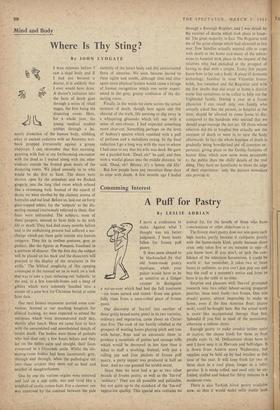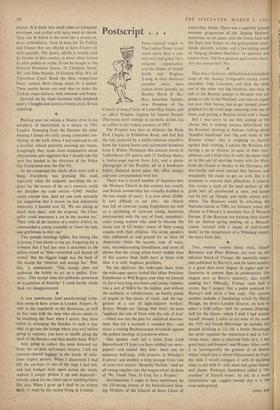Consuming Interest
A Puff for Pastry
By LESLIE ADRIAN
I HAVE a confession to make. Against what I thought was my better judgment, I have lately fallen for frozen puff pastry.
It does seem absurd to be blackmailed by that old home-made pastry mystique, when your palate would have to be as sensitive as a Geiger counter to distinguish
a vol-au-vent which had had the full treatment
—six times turned and rested—from one grace- fully risen from a once-rolled piece of frozen paste.
Our discovery of lus-roll' (yet another of those grisly brand-name puns) in its two varieties, ordinary and vegetarian, came about on Christ- mas Eve. The cook of our family rebelled at the prospect of wasting hours playing pitch and toss with butter, flour and an automatic timer to produce a mountain of patties and sausage rolls which would be devoured in less time than it takes to stuff a stocking. Instead, with just a rolling pin and four packets of frozen puff pastry, a party supper was produced in half an hour. And no one guessed the sordid secret.
Since then we have had a go at two other brands of frozen pastry, as well as the lus-rols 'ordinary.' They are -all passable and palatable, but not quite up to the standard of the `Jus-rot' vegetarian quality. This special mix contains no animal fat, for the benefit of those who have conscientious or other objections to it.
The frozen short pastry does not win quite such high marks, partly because it compares poorly with the home-made kind, partly because short crust only takes five or six minutes to mix—if you know how. If you don't, or. lack the con- fidence of the television housewives, it could be worth it: but remember, it takes two or three hours to unfreeze, so you can't just pop out and buy the stuff at a moment's notice and hope to have it on the table in no time.
Surprise and pleasure with 'Jus-rol' prompted research into two other labour-saving prepared pastries; these were fresh—not frozen. One was strudel pastry, almost impossible to make at home, even if the fine Austrian flour, glattes mehl, could be bought here. But the actual work is more like occupational therapy than fun. Splendid if you feel in need of the monotony; otherwise a tedious chore.
Enough pastry to make strudels (either apfel or topfen, the cheese kind) for three or four people costs Is. 9d. Delicatessen shops have it, and I have seen it in Harrods and Selfridges. It is flown from Austria every Wednesday, but supplies may be held up by bad weather at this time of the year. It will keep fresh for two or three days in a cool place, longer in a refri- gerator. It is ready rolled, and need only be un- folded, stuffed and baked for thirty minutes in a moderate oven.
There is also Turkish biirek pastry available now, so thin it would make mine feuille look clumsy. It is made into small tubes or triangular envelopes, and stuffed with spicy meat or cheese. They can be baked in the oven like a strudel or, more authentically: fried in deep fat. In Turkey and Greece they are offered as hors d'oeuvre or with aperitifs. The pastry, which is usually sold by Greeks in this country, is more often known as philo pastry or yufka. It can be bought at the Oriental Provision Stores, 25 Charlotte Street, WI, and John Pascalis, 35 Grafton Way, Wt. off Tottenham Court Road (he likes twenty-four hours' notice). Both charge about 5s. a pound. These pastry leaves are used also to make the Turkish sweet baklava, with almonds and honey.
Spurred on by these successes with prepared pastry I bought and tasted a frozen pizza. It'was appalling.
Parking your car outside a theatre, even in the periphery of theatrefand, is a luxury in 1961 London. Emerging from the Duchess the other evening I found two jolly young constables con- versing on the kerb, where I had expected to see a familiar vehicle patiently awaiting my return. Laughingly they made some explanation about obstructions and suggested that I should take the next bus headed in the direction of the Police Car Compopnd near the Old Vic, At the compound the whole affair went with a bang. Everybody was grinning like mad, especially when the sergeant, searching the re- gister for the reason of the car's removal, could not decipher the code initials—UNO. Neither could anyone else. And no one took seriously my suggestion that it meant we had diplomatic immunity. I handed over £2. 'We are taking so much these days,' said the sergeant, 'the Chan- cellor could announce a cut in the income tax.' Then, with all the hauteur of a maitre d'hôtel, he commanded a young constable to 'show the lady and gentleman to their car.'
Two pounds (sterling) lighter, but feeling like a tycoon, I was shown to my car, forgetting for a moment that I had just seen it described in the police record as `blue—scratched and dented all round.' But the biggest laugh was the back of the receipt for 'removal and storage fee.' Ped- lars,' it announced: 'This receipt does not authorise the holder to act as a pedlar. Fire- arms: This receipt does not authorise possession or acquisition of firearms.' I could hardly choke back my disappointment.
*
A new unwelcome (and unwelcoming) irrita- tion seems to have arisen at London Airport. As well as the cogwheels in the showcases, as well as that man with the mop who always seems to be swabbing the floor when I arrive, they have taken to arranging the benches in such a way that, to get into the lounge where you wait before going to customs, you have to shuffle along the back of the benches and then double back. Why?
And, going to collect this same battered car from the car-park at London Airport, I left my customs-cleared luggage in the hands of solic- itous airport porters. When I discovered I had left the car-keys in one of the bags I had left, and had trudged back again across the windy asphalt, I simply pickcd it up and departed— nobody asked for the claim tag or anything fancy like that. When I grow up I shall be an airport thief--it must be the easiest living in London.







































 Previous page
Previous page